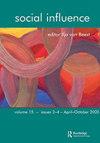模仿助长社会偏见:在健康预防案例中不切实际的乐观
IF 0.6
3区 心理学
Q3 PSYCHOLOGY, SOCIAL
引用次数: 1
摘要
与同龄人相比,当一个人认为自己受到威胁的风险更小时,就会出现不切实际的乐观偏见。这种偏见已被广泛报道,其后果是显而易见的:它将一个人的健康置于危险之中。现有文献提出,自我中心主义是导致这种偏见减少的一种机制。这篇论文测试了一种新的机制,即将一个人导向他人,从而与自我中心主义联系起来。,模仿。结果显示了直接相反的效果:模仿使人更倾向于认为自己受到的威胁更小。这一结果不仅令人惊讶,而且尤其令人担忧,因为模仿可能用于医患对话,这可能适得其反,导致对医生提供的医疗建议的抵制。©2023作者。由Informa UK Limited出版,以Taylor & Francis Group的名义进行交易。本文章由计算机程序翻译,如有差异,请以英文原文为准。
Mimicry boosts social bias: unrealistic optimism in a health prevention case
Unrealistic optimism bias appears when a person perceives oneself–in comparison to peers–as less at risk from threats. This bias has been widely reported and the consequences are clear: it puts one's health in danger. The existing body of literature proposes egocentrism as a mechanism leading to a reduction in this bias. The present paper tests a novel mechanism orienting a person toward others–thus linked with egocentrism–i.e., mimicry. Results showed directly opposing effects: mimicry induced a stronger tendency to perceive oneself as less threatened. This result is not only surprising but especially alarming since mimicry may be used in patient-doctor dialogue which may backfire, leading to resistance to medical recommendations provided by the doctor. © 2023 The Author(s). Published by Informa UK Limited, trading as Taylor & Francis Group.
求助全文
通过发布文献求助,成功后即可免费获取论文全文。
去求助
来源期刊

Social Influence
PSYCHOLOGY, SOCIAL-
CiteScore
1.50
自引率
0.00%
发文量
4
期刊介绍:
Social Influence is a journal that provides an integrated focus for research into this important, dynamic, and multi-disciplinary field. Topics covered include: conformity, norms, social influence tactics such as norm of reciprocity, authority, scarcity, interpersonal influence, persuasion, power, advertising, mass media effects, political persuasion, propaganda, comparative influence, compliance, minority influence, influence in groups, cultic influence, social movements, social contagions, rumors, resistance to influence, influence across cultures, and the history of influence research.
 求助内容:
求助内容: 应助结果提醒方式:
应助结果提醒方式:


